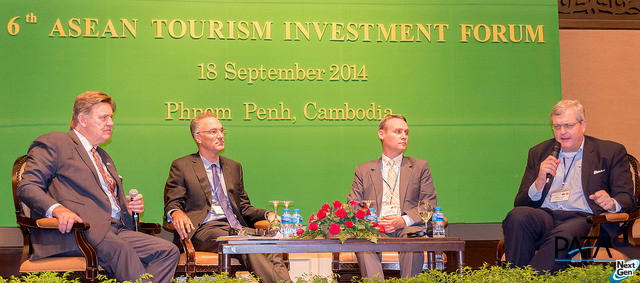PHNOM PENH, 2014-9-23 — /Travel PR News/ — On Thursday, September 18, 2014, a Pacific Asia Travel Association (PATA) panel marked the opening session of the 6th ASEAN Tourism Investment Forum, during an afternoon of meaningful discussions on the future of tourism in the region.
Moderated by PATA CEO Martin Craigs, the panel featured distinct perspectives within the hospitality investment sector including Seth Hoeger, Managing Director, Song Saa Private Island; Charles Blocker, CEO, IC Partners; and L-Martin Desautels, Managing Partner, DFDL.
Under the topic, “Sweating all assets – ensuring your proposition is clear and the interdependence of industry sectors is recognized by private and public sectors,” the panellists discussed Cambodia’s opportunities and obstacles in attracting investment. The major topics arising included air connectivity, human capital development, and the ASEAN Economic Community’s (AEC) goal of regional economic integration by 2015.
Beginning the panel, when asked, “What are Cambodia’s biggest opportunities and obstacles,” Mr. Blocker set the stage by answering that Cambodia’s present positioning needs to consider more involvement of low cost carriers; noting that “accepting more flights is an opportunity that exists.” He added, “We don’t need luxury hotels everywhere.”
Other panellists agreed, with Mr. Hoeger noting that Sihanoukville’s airport also needs more international connections. Mr. Desautels also stated that the addition of flights between Siem Reap and Sihanoukville has already made a big difference in visitation. Panellists agreed that Cambodia needs greater access to more airports and must proactively allow inbound and outbound flights for tourists. Funding can come from private or public, but the underlying message is to ‘build it, and they will come.’
Mr. Blocker also raised the issue of human capital development, emphasizing Cambodia’s history. “It’s unique and authentic,” he said. “Cambodia has a fantastic story to tell.” Panellists discussed the value of soft asset development, with Mr. Hoeger bringing Song Saa’s experience to the debate when Mr. Craigs asked if AEC 2015 would allow the resort to hire the best and the brightest in the hospitality industry.
Replied Mr. Hoeger, “We started off with 15 expats working at Song Saa, and now we are down to 5,” illustrating the desire to invest domestically in human software. Song Saa is developing its well over 100 local staff, which operates 27 villas on the private island.
Mr. Craigs added that there is a need for institutions that train on hospitality; China as an example, has over 2,000 tertiary institutions that offer various degrees, academic and vocational.
This point of human development generated discussion amongst the audience, with PATA Vice Chairman Kevin Murphy noting that a university degree is not always necessary for an entry level position to allow a career in the industry, which is an advantage to those starting as less formally educated. Another audience member noted that sometimes, students have academic knowledge of the sector, but lack hard skills.
In terms of AEC 2015, panellists predicted that would expedite the MICE sector potential, and that there would generally be less red tape and more flexibility on the labour and customer pools. The panellists were unanimous in saying that AEC 2015 would not have a fundamental impact on the playing field. Rather, they called for more investment from the taxpayer’s government, as well as liberalization of regulations, which would then better allow for further co-investment and joint ventures, long-term leases, and facilitation of an investor-friendly environment as a potentially early AEC 2015 benefit of more lasting value to tourism.
Song Saa’s success in obtaining a government land lease has now set the precedent, and the Managing Director of the luxury property predicts an explosion in investment in the country and region.
Coupled with the strengthened branding of the nation, the inclusion of airlinks in national strategy, focus on youths, and the strengthening of legal framework for private financing, Mr. Desautels, Mr. Blocker, and Mr. Hoeger all agreed that investment and its successes depend on the continued regulatory and institutional liberalisation.
-ENDS-
About PATA
Founded in 1951, the Pacific Asia Travel Association (PATA) is a not-for profit association that is internationally acclaimed for acting as a catalyst for the responsible development of travel and tourism to, from and within the Asia Pacific region. The Association provides aligned advocacy, insightful research and innovative events to its member organisations, comprising 90 government, state and city tourism bodies, nearly 30 international airlines, airports and cruise lines, 57 educational institutions, and hundreds of travel industry companies in Asia Pacific and beyond. Thousands of travel professionals belong to the 43 local PATA chapters worldwide. The chapters organise travel industry training and business development events. Their grassroots activism underpins PATA’s membership of the Global Travel Association Coalition (GTAC), which includes ACI, CLIA, IATA, ICAO, WEF, UNWTO and the WTTC. ThePATAmPOWER platform delivers unrivalled data, forecasts and insights from the PATA Strategic Intelligence Centre to members’ desktops and mobile devices anywhere in the world. PATA’s Head Office has been in Bangkok since 1998. The Association also has official offices or representation in Beijing, Sydney, Dubai, London and New York. Visit www.PATA.org.
Media Contact:
PATA
Paul Pruangkarn
Manager – Communications
Bangkok, Thailand
Tel: +66 2 658 2000
E-mail: Communications@PATA.org
Online newsroom: www.PATA.org/Press
###

